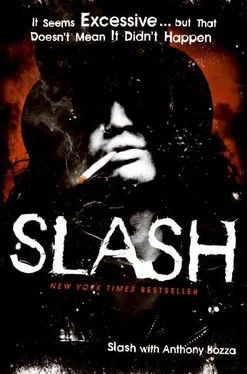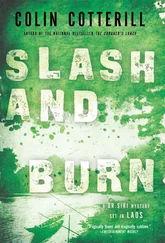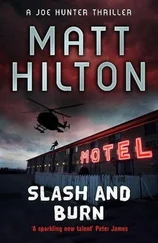THE ACTUAL RECORDING OF THE GUITARS and vocals of the Illusion albums happened at the Record Plant in Los Angeles. This was a great time for me as a guitar player—we had so many songs and so many possibilities for sounds and techniques in our new material. I was really on top of my game at that point, easily coaxing out the sounds I wanted, all of it came to me so fluidly during those sessions. I had some cool guitars to call upon because, for first time in my life, I had the funds to assemble an arsenal of them.
At the time I had a 1958 Gibson Flying V, I had a 1958 Gibson Explorer, and a few Travis Beans, a few sorted acoustics—Martin, Gibson, Taylor, etc. I had this great Spanish flamenco-style acoustic and a couple of Dobros and a handful of vintage Les Pauls, plus my staple Les Paul replica with its Seymour Duncan pickups. I’d rented a load of guitars, but for most of the tracks I used a Les Paul. There were moments when I needed a Travis Bean, usually when I was doing extensive slides (“The Garden”), or a Dobro (“You Ain’t the First”), as well as when I needed to use a tremolo bar (“You Could Be Mine”). It was a gluttonous guitar experience for me (I even took twenty guitars on the road); I was determined to go to town on all of them, dead set on getting all of those sounds on our new album in some way, shape, or form. I had thirty-six songs to play on—that meant two straight weeks of recording guitar parts. I was in seventh heaven, just absorbed in my guitars, totally in my element. It was great, the room sounded great, and I loved the staff at the Record Plant.
One event that got everyone talking during the recording of Illusions I and II was the day there was a huge commotion in the alley. It turned out that the cops found a dismembered arm and a head in the Dumpster behind the studio. All I know is that we didn’t do it, but Izzy turned the event into a lyric on “Double Talking Jive.” And I got to do a great Spanish flamenco thing on that track, which was a gas to do. That song has a really cool electric solo, too, that morphs into an acoustic flamenco groove.
There were a few songs that were very involved guitar-wise on those albums. “Estranged” was a big, long song. I used a Les Paul Gold Top on it; I recorded all of the melodies on the rhythm pickup with the tone turned all the way down. “November Rain” was tough, too, as was another Axl song called “Breakdown.” Those were all piano driven and they needed accompaniment; the guitar and bass parts had to be thought out and done precisely. Those songs were all pretty fucking cool, I have to say, but they took some work.
“November Rain” was recorded in one day but we put in long hours ahead of time to get all of the arrangements just right. The funniest thing is that the guitar solo that ended up on the record is the exact same one that I played the first time I heard the song years before. That’s a consistent theme throughout Guns N’ Roses: pretty much every solo on the record is the same exact one I played the first time I ran through it. It’s just the way the song felt to me every time we got to that section. So throughout the band’s history, when we were playing the songs live or on record, give or take a few notes here and there, my solos, which have always been more melodies than flat-out busting moves, have always been the same series of notes I heard within the music from the very start. The end result was that there was always a sense of familiarity that I enjoyed when we’d play those songs and get to those sections.
Anyway, “Breakdown” was very complicated as far as getting all of the drum and guitar parts just right back at A and M, as well as the intricate piano changes. It’s a complex song, and as much as it sounds like we partied our way through recording, we were very focused when it came to work. That song was hard on Matt especially—he lost it a few times trying to get the drums perfect. Like I said, we did a song a day—but some days were longer than others.
We had intricate songs, we had complex songs, and I think only bands like Metallica were doing anything similar to what we were doing. They seriously focused on meter changes and all that on The Black Album, and I don’t know what their process was, but we would get our framework together, then just jam on it. If we made a mistake or did a real train wreck section, we’d go back and do it again, and usually we’d pull it together really quickly. Everyone in the band had a short attention span at that point, and no one wanted to work too long on one thing. We’d spend a few days on the arrangements, but when it came down to recording, we’d do one run-through and then the red light was on . It was a given that there would be some guitar overdubs and some vocals done later, but when it came to the basic guitar, bass, and drum tracks, all of those live takes had to be keepers. No one wanted to embarrass himself by causing us to do it over and over while the other guys in the band waited for you to get it right. That’s what happens when you have good musicians, good chemistry… just the right people, in a good fucking band.
Guns took over the Record Plant. It was definitely indulgent, but we had a lot of work to do, and we had a really, really good time being Guns N’ Roses again. I did guitars in one studio and Axl more or less made the other studio into an apartment, because he had decided that he’d get more work done if he lived there. He moved his exercise equipment in, as well as a bed and couches—it became a glorified lounge where he and his entourage might be comfortable. We definitely had a lot of traffic coming through the Record Plant in those days.
In my opinion none of that was conducive to getting our work done any quicker. All the same, while recording the Illusion albums we had a very bohemian, 1960s kind of scene going on around the studio; the combination of our friends—musicians and otherwise—plus all the other people we knew made for a very cool backdrop. Any given night I might be laying down guitars in one studio while Axl was doing vocals in the other while a cast of interesting characters hung around participating in one way or another. Shannon Hoon from Blind Melon came by often because he was an old friend of Axl’s from Indiana; he sang backup on “Don’t Cry,” which made that song all the more soulful.
The biggest change in the band, aside from Matt replacing Steven, was the overwhelming presence of keyboards and synthesizers. Axl had introduced a screaming synth line in “Paradise City,” back in the Appetite days. That was the start of it, I suppose, and I was opposed to that, too. As I mentioned, on the Illusion albums Axl was insistent on a major piano and synth presence. After we’d done the basic tracks, after I’d done my guitar parts, once it was time for Axl to do his vocals, he spent a lot of time adding synthesizer parts. He was like a kid in a candy store with all of these banks of keyboards he’d had installed in the studio. He’d sit there for hours to get the right sound for one section of a song, and remember, this guy was not strung out, he was not wasted, although he was stoned on pot a lot—which probably made him obsess over that stuff even more. Axl was that into the grandiose production thing, which was not so good on the one hand, but all things considered, on the flip side he had so much integrity about it that he’d spend however long it took to ensure that the sonic drama was perfect . What he ended up with at the end of the day was fucking brilliant. I don’t know if it represented Guns in my head, but it sounded amazing regardless. When we did “Live and Let Die,” it was all synths—those horns are not horns. What Axl did there was really complex; he spent hours dialing all of that shit in, getting the nuances just right, and I have to give him that. He did the same for “November Rain” with all of those fucking string arrangements—they were all synth. I’ve heard songs with real strings that sound less authentic. The only time that we brought in outside musicians on those two records were the gospel singers on “Knockin’ on Heaven’s Door” and the harmonica on “Bad Obsession.” The only other effect that wasn’t synthesized was the defibrillator at the very beginning of “Coma.” Yeah, that was real.
Читать дальше
Конец ознакомительного отрывка
Купить книгу




![Сол Слэш Хадсон - Slash. Демоны рок-н-ролла в моей голове [litres]](/books/387912/sol-slesh-hadson-slash-demony-rok-n-thumb.webp)


